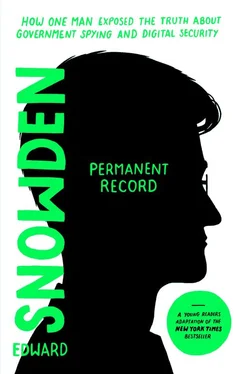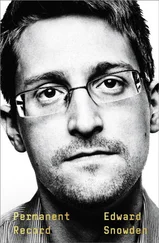We lived in Crofton, Maryland, halfway between Annapolis and Washington, DC. Crofton itself is a planned community; on a map, it resembles the human brain, with the streets coiling and kinking and folding around one another. For my parents, this was an exciting time. Crofton was a step up for them, both economically and socially. Our backyard was basically a golf course, with tennis courts just around the corner, and beyond those an Olympic-size pool. It took my father just forty minutes to get to his new posting as a chief warrant officer in the Office of Aeronautical Engineering at Coast Guard Headquarters, which at the time was located at Buzzard Point in southern Washington, DC, adjacent to Fort Lesley J. McNair. And it took my mother just twenty or so minutes to get to her new job at the NSA, whose boxy futuristic headquarters forms the heart of Fort Meade.
As we lived so close to the headquarters of many government agencies, this type of employment was normal in our area. Neighbors to our left worked for the Defense Department; neighbors to the right worked in the Department of Energy and the Department of Commerce. For a while, nearly every girl at school on whom I had a crush had a father in the FBI.
For me, Fort Meade was just the place where my mother worked, along with about 125,000 other employees, approximately forty thousand of whom lived on-site, many with their families. The base was home to over 115 government agencies in addition to forces from all five branches of the military. The base has its own post offices, schools, police, and fire departments. Area children, military brats and civilians alike, would flock there daily to take golf, tennis, and swimming lessons. Though we lived off base, my mother still used its commissary as our grocery store to stock up on items in bulk. She also took advantage of the base’s PX, or post exchange, as a one-stop shop for tax-free clothing for my sister and me.
Both my parents had top secret clearances, but my mother also had a higher-level security check that members of the military aren’t subject to. My mother was the furthest thing from a spy. She was a clerk at an independent insurance association that serviced employees of the NSA—she provided spies with retirement plans. But still, she had to be vetted as if she were about to parachute into a jungle to stage a coup.
My father’s career remains fairly murky to me to this day. In the world I grew up in, nobody really talked about their jobs—not just to children, but to each other. Tech people rarely, if ever, have a sense of the broader purposes of the projects to which they’re assigned. And the work that consumes them tends to require such specialized knowledge that to bring it up at a barbecue would get them disinvited from the next one, because nobody cared.
In retrospect, maybe that secrecy led to the problems we currently face.
It was soon after we moved to Crofton that my father brought home our first desktop computer and set it up—much to my mother’s chagrin—smack in the middle of the dining room table. From the moment it appeared, the computer and I were inseparable. It had what at the time felt like an impossibly fast 25-megahertz Intel 486 CPU and a color monitor that could display up to 256 different colors. (Your current device can probably display in the millions.) It was amazing.
This computer became my constant companion. My parents would call my name to tell me to get ready for school, but I wouldn’t hear them. They’d call my name to tell me to wash up for dinner, but I’d pretend not to hear them. And whenever I was reminded that the computer was a shared computer and not my personal machine, I’d relinquish my seat with such reluctance that as my father or mother or sister took their turn, they’d have to order me out of the room entirely lest I hover moodily over their shoulders and offer advice.
I’d try to rush them through their tasks, so I could get back to mine, which were so much more important—like playing Loom . Loom was about a society of Weavers whose elders create a secret loom that controls the world. When a young boy discovers the loom’s power, he’s forced into exile, and everything spirals into chaos until the world decides that a secret fate machine might not be such a great idea after all.
Unbelievable, sure. But then again, it’s just a game.
Still, it wasn’t lost on me that the machine in the game was a symbol of sorts for the computer on which I was playing it. And then there was the long gray cord that connected the computer to the great wide world beyond. There, for me, was the true magic: I could dial up and connect to something new called the internet.
Nowadays, connectivity is just presumed. Smartphones, laptops, desktops, everything’s connected, always. Connected to what exactly? How? It doesn’t matter. You just tap the icon, and boom, you’ve got it: the news, pizza, streaming music, and streaming video that we used to call TV and movies. Back then, however, we plugged our modems directly into the wall.
I’m not saying that I knew much about what the internet was, or how exactly I was connecting to it, but I did understand the miraculousness of it all. Because in those days, when you told the computer to connect, you were setting off an entire process. It would beep and hiss like a traffic jam of snakes, after which—and it could take whole minutes—you could pick up any other phone in the house on an extension line and actually hear the computers talking . You couldn’t understand what they were saying to each other, of course, since they were speaking in a machine language that transmitted up to fourteen thousand symbols per second.
Internet access, and the emergence of the Web, was my generation’s big bang. It irrevocably altered the course of my life, as it did the lives of everyone. The internet was my sanctuary. If it were possible, I became more sedentary. If it were possible, I became more pale. Gradually, I stopped sleeping at night and instead slept by day in school. My grades went back into free fall.
I wasn’t worried by this academic setback, however, and I’m not sure that my parents were, either. After all, the education that I was getting online seemed better and even more practical for my future career prospects than anything provided by school. That, at least, was what I kept telling my mother and father.
My appetite wasn’t limited to serious tech subjects like how to fix a CD-ROM drive, of course. I also spent plenty of time on gaming sites. But I was generally just so overwhelmed by the sheer amount of information immediately available that I’m not sure I was able to say where one subject ended and another began. A crash course on how to build my own computer led to a crash course in processor architecture, with side excursions into information about martial arts, guns, and sports cars.
It was like I was in a race with the technology. I started to resent my parents whenever they would force me off the computer on a school night. I couldn’t bear to have those privileges revoked, disturbed by the thought that every moment that I wasn’t online more and more material was appearing that I’d be missing.
How can I explain it to someone who wasn’t there? Back then, being online was another life, considered by most to be separate and distinct from Real Life. The virtual and the actual had not yet merged. And it was up to each individual user to determine for themselves where one ended and the other began.
It was precisely this that was so inspiring: the freedom to imagine something entirely new, the freedom to start over. As the millennium approached, the online world became increasingly centralized and consolidated, with both governments and businesses accelerating their attempts to intervene in what had always been a fundamentally peer-to-peer relationship. But for one brief and beautiful stretch of time the internet was mostly made of, by, and for the people. Its purpose was to enlighten, not to make money. I consider the 1990s online to have been the most pleasant and successful anarchy I’ve ever experienced.
Читать дальше












